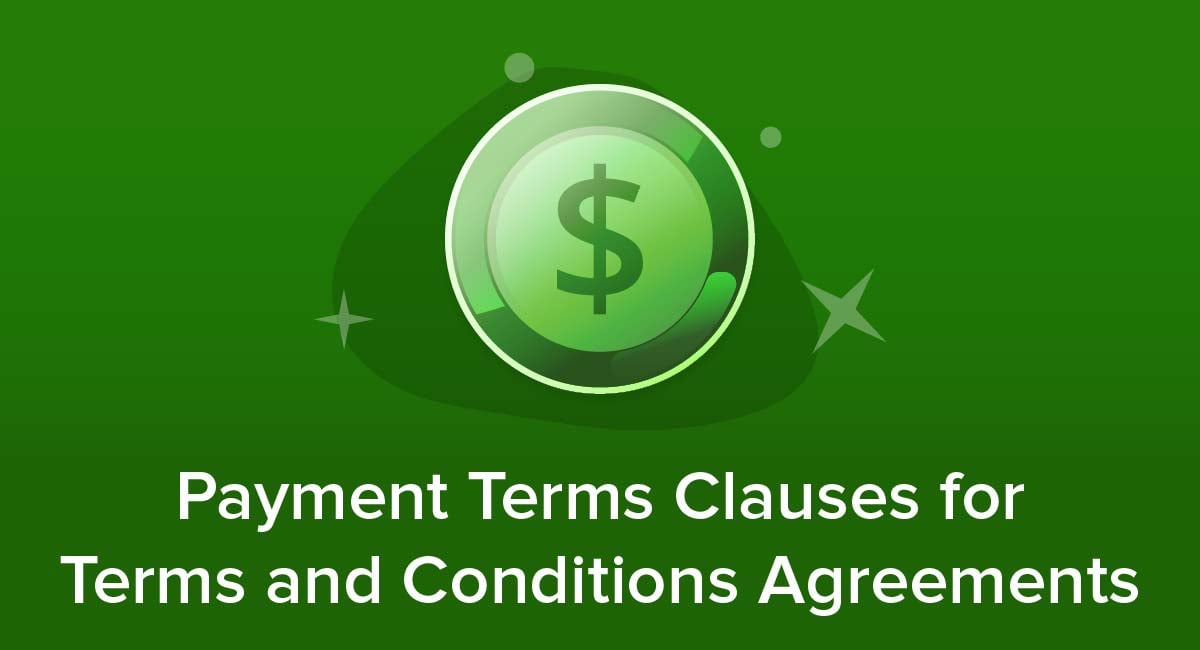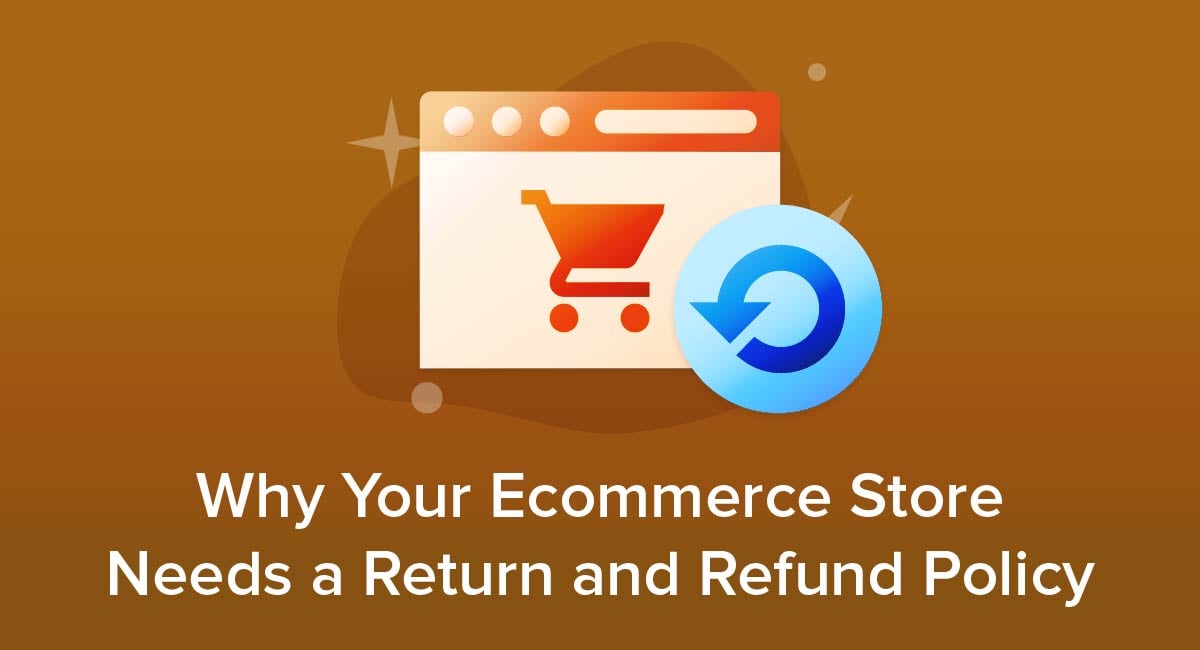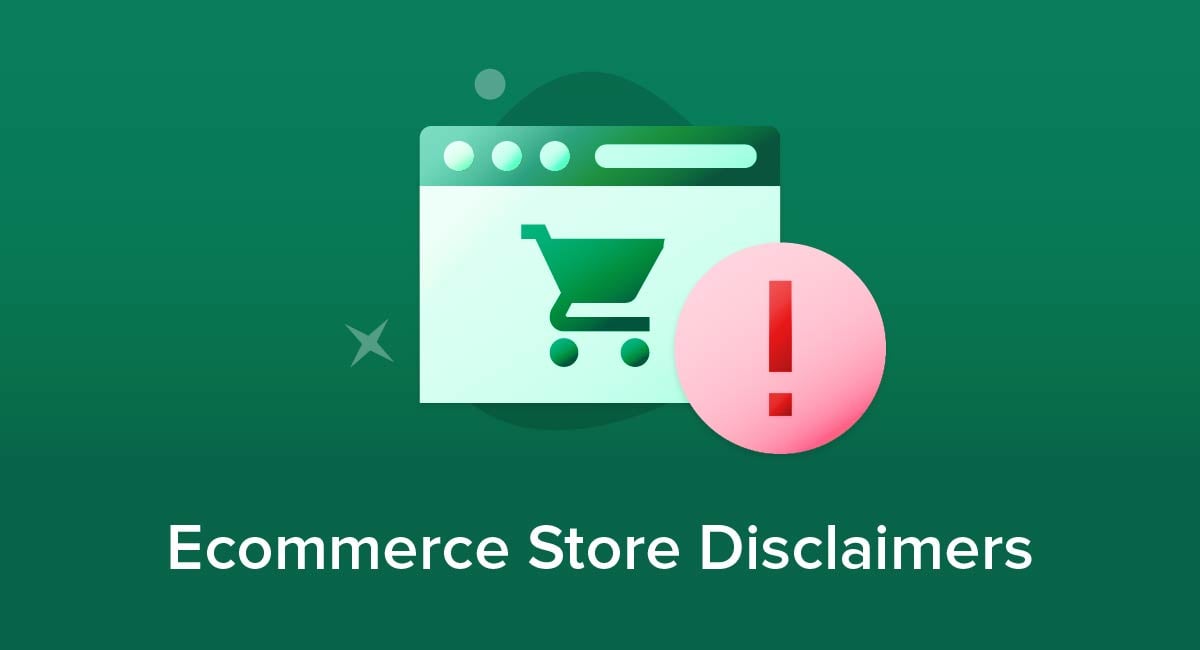
Disclaimers are essential statements to include on any website or app, including your ecommerce store.
A disclaimer for a website is a vital layer of protection for a company as it limits your site's liability to users. For an ecommerce business, having disclaimers on your website can be even more beneficial.
Below we'll explain why disclaimers are important for ecommerce stores and the types of disclaimers to have on your site.
Our Free Disclaimer Generator is designed to help you comply with the requirements of various affiliate programs, such as Amazon Associates. It also includes various disclaimers like medical disclaimer, fitness disclaimer, website disclaimer and so on.
Just follow these few simple steps and generate a Free Disclaimer for your site or your app:
- Start by choosing the "Free Disclaimer Generator" on our site.
-
Then select where your Disclaimer will be used on:
-
Follow with adding your website/app information:
-
Enter the country and click on the "Next Step" button:
-
Continue with building your Disclaimer and answer on questions about your business from our wizard:
-
Now just enter your email address where you'd like your Disclaimer sent and click on the "Generate" button.
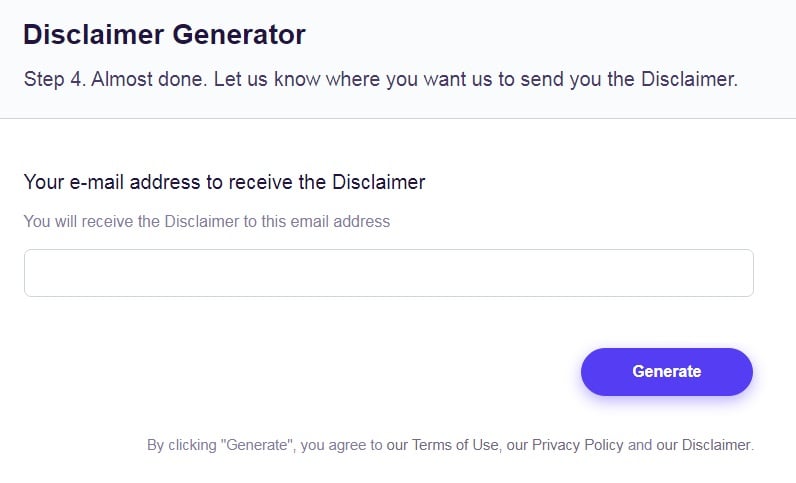
You're done! You can copy and paste your Disclaimer code into your website/app, or link to your hosted Disclaimer page.
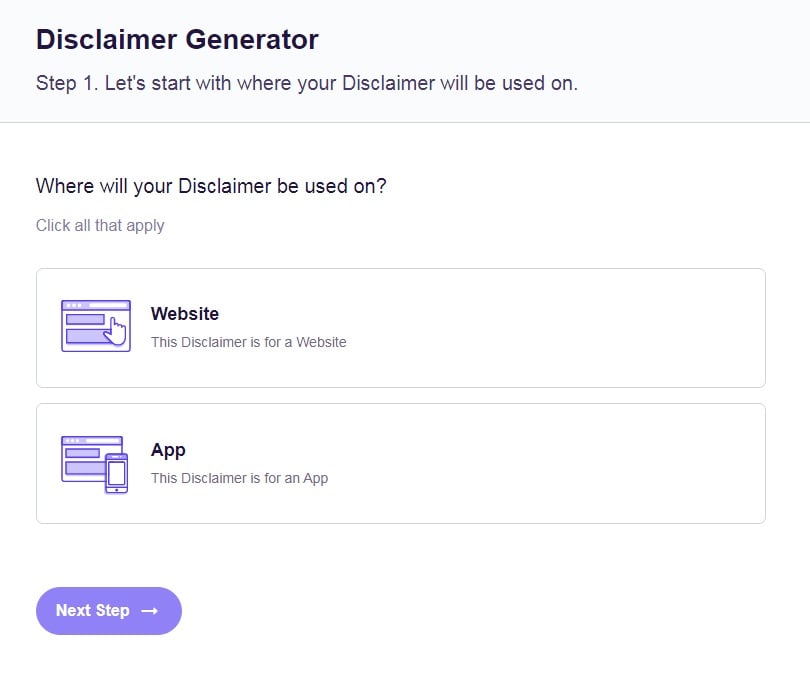
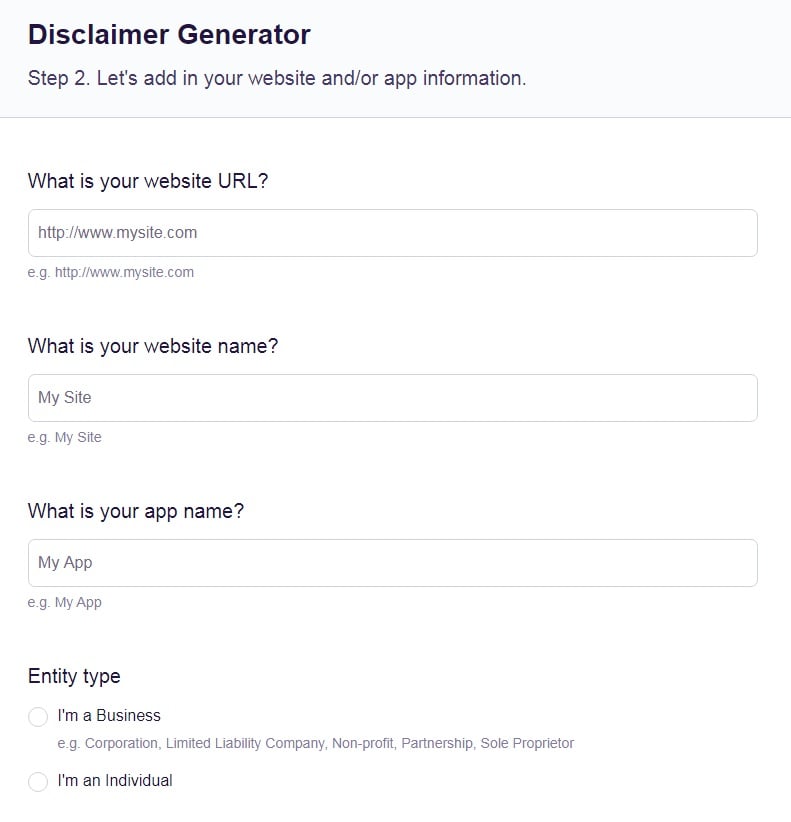
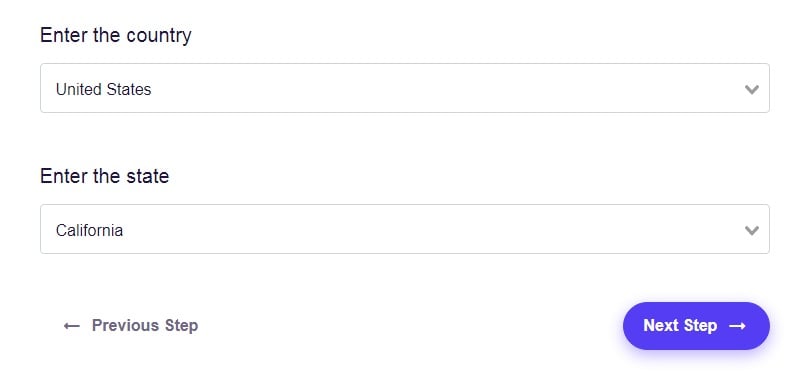
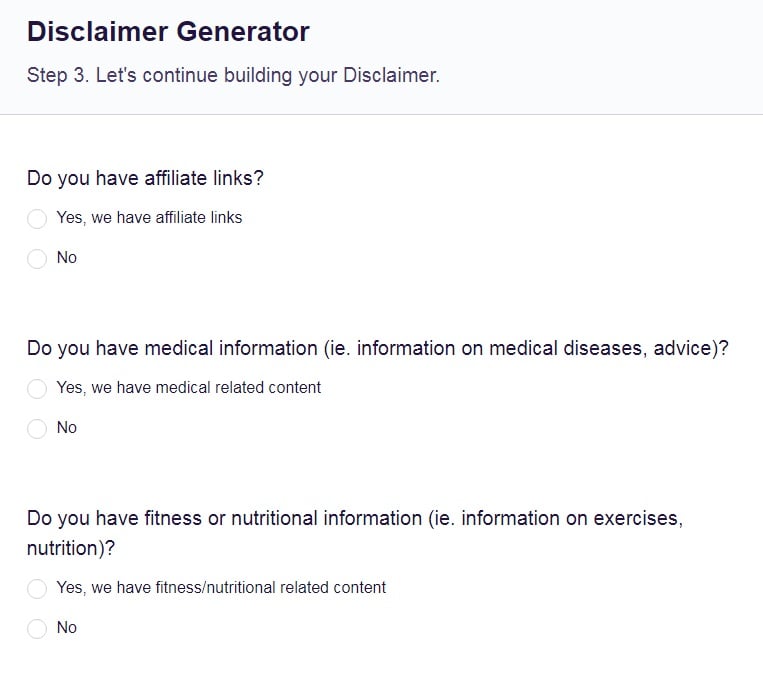
- 1. Why Include Disclaimers?
- 2. Disclaimers v. Terms of Use and Privacy Policies
- 3. Types of Ecommerce Store Disclaimers
- 3.1. Limitation of Liability
- 3.2. Disclaimers of Warranties
- 3.3. Third-Party Disclaimers
- 3.4. "AS IS" Disclaimer
- 3.5. Accuracy Disclaimers
- 3.6. Return and Refund Policies
- 3.7. Shipping Delays
- 3.8. Affiliate Disclaimers
- 3.9. Medical/Legal Disclaimers
- 3.9.1. Medical/Health Disclaimer
- 3.9.2. Legal Disclaimer
- 3.10. Financial Disclaimers
- 3.11. Separate Page Disclaimers
- 4. Summary
Why Include Disclaimers?
A disclaimer is used primarily to notify or warn users of the limit or the extent to a website's liability to a user if there is a legal action.
For example, if you have a disclaimer that states you are not liable for any issues a user may have when they click on a third-party link on your site and a user does end up having an issue, that disclaimer can protect you.
Disclaimers are a key way a website can prevent potential future liability from the use of their site or errors and omissions on the site. Any website or app should have disclaimers for protection, but they are highly recommended for ecommerce sites.
Including these statements can protect an ecommerce store from any issues in shipping, returns, refunds, third party partners, or affiliates. Ecommerce stores are unique because people often rely on these websites to not have issues. However, sometimes things do happen and disclaimers act as safeguards against this.
Disclaimers for ecommerce stores are also worth including if your website features products from other sites. A disclaimer can warn users that your site is not liable for products that are created by another party even though they purchased it through your site.
People sometimes confuse disclaimers with other agreements on a website, such as a Terms of Use or a Privacy Policy. While including all of these is essential to protect your site, disclaimers do offer something different.
Disclaimers v. Terms of Use and Privacy Policies

If your ecommerce store already has a Terms of Use and a Privacy Policy, should you also have disclaimers? Yes, there are some key differences between these that make including all three very important.
The first thing to realize is a disclaimer is not a legal agreement. Disclaimers are simply statements or clauses to notify users of the limitation of a website's liability for the use of the site.
Contrastly, a Terms of Use and a Privacy Policy are actual agreements between the user and the website. A Terms of Use states how a user may interact with a site and a Privacy Policy discloses how a website handles a user's private information. When users agree to these agreements, they are bound to them.
Another key difference is most disclaimers are not legally required, whereas Privacy Policies are required by multiple laws.
Though, one type of disclaimer that is legally required is an affiliate disclaimer. The FTC does require websites or ecommerce stores to include an affiliate disclaimer if they receive a commission from a product or link that is featured on their website.
Where many get confused about a disclaimer and a Terms of Use or Privacy Policy is disclaimers are often included in these agreements.
For example, Disclaimers of Warranties and Limitations on Liabilities are often part of a Terms of Use agreement.
Now that we know why disclaimers on an ecommerce website are important, let's take a look at the different types of disclaimers you may need.
Types of Ecommerce Store Disclaimers

There are multiple disclaimers you can provide on your ecommerce store, and you will likely have more than one. Which ones you include depends upon your website and what you offer.
There are some disclaimers that all websites have, no matter if it is an ecommerce site or not, and some that are more specific.
Below is a list of some key disclaimers your ecommerce site should have to protect it from potential issues.
Limitation of Liability
One of the most important disclaimers for any site is a Limitation of Liability disclaimer.
Since at their core disclaimers are meant to warn users of the limits or scope of a website's liability to them, having a Limitation of Liability is essential. Most Limitation of Liabilities are similarly worded, but you can include specific limitations related to your product or service if you wish.
A Limitation of Liability disclaimer is typically found in a site's Terms of Use. An example of a general Limitation of Liability disclaimer is from Allbirds that states the website is not liable for indirect direct issues or damages resulting from using the site:

Another example is IKEA's Limitation of Liability that provides a list of what exactly IKEA is not liable for, such as the inability to use the website or statements made by a third party on the site:
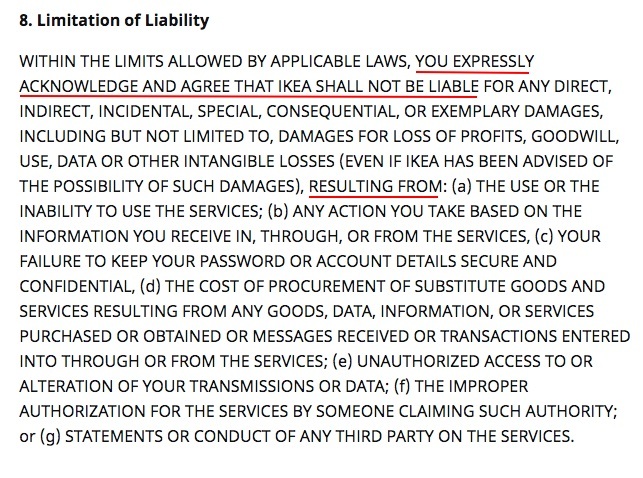
Disclaimers of Warranties
Usually included right next to Limitation of Liabilities and in the Terms of Use is another disclaimer any website should have. A Disclaimer of Warranties is a statement that notifies users of what the website does not guarantee or warrant to the user.
This disclaimer is important for ecommerce sites since it can protect you from potential issues relating to the product you are selling.
Eagle Creek's Disclaimer of Warranties is an example of a typical disclaimer that disclaims any express or implied warranties resulting from using the site or Eagle Creek's products:
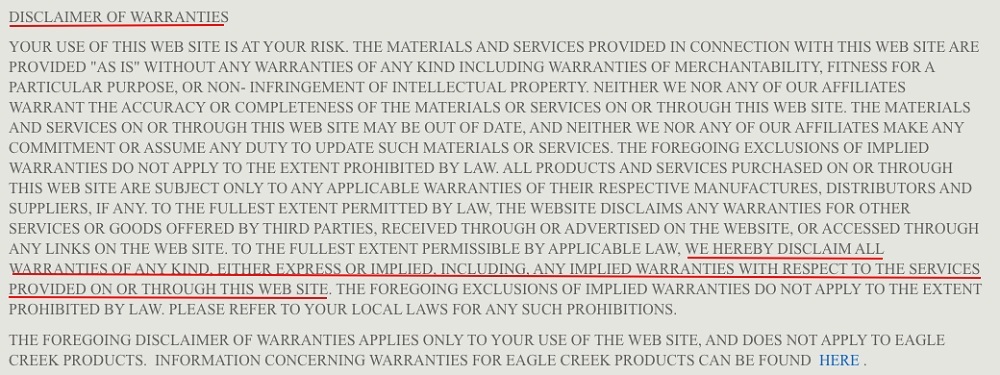
In a Disclaimer of Warranty disclaimer, you can be specific. If you are selling clothes or sports equipment, you can disclaim any guarantees about those specific products as Adidas does in its Disclaimer.
Adidas does not promise the use of the site will be error-free and disclaims liability for claims because of normal wear and tear of its clothes and shoes:
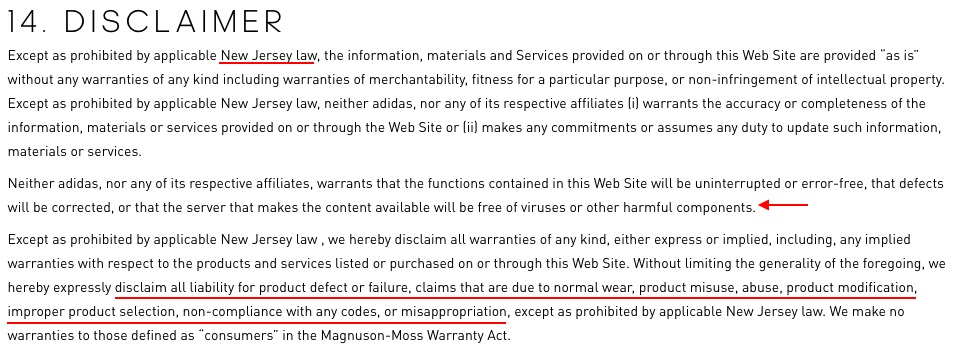
Third-Party Disclaimers
Similar to warranties, if your ecommerce site includes links, recommendations, or features third-party products on your site, a third-party disclaimer can be very helpful.
These disclaimers notify users that your website is not liable for any issues resulting from a user clicking on a third-party link or purchasing a third-party product.
Rick Steves features third-party links it recommends for purchasing its products. However, the site disclaims any responsibility when a user leaves the website and Rick Steves' policies no longer are applicable:

Sephora includes a statement that it doesn't guarantee that third-party content will be accurate and it is not responsible for updating that content:

"AS IS" Disclaimer
An "AS IS" or "AS AVAILABLE" disclaimer is common on most websites and apps. The disclaimer isn't a stand-alone statement. It is often part of the Disclaimer of Warranty or Limitation of Liability.
The "AS IS" disclaimer warns the site is as-is and users are accepting whatever bugs or issues are with the site at their own risk. "AS AVAILABLE" disclaimers notify users that they can purchase products but there is no guarantee they will be available.
Peloton states it offers its site "AS IS" and "AS AVAILABLE" and further explains that users are visiting and using the website at their own risk:
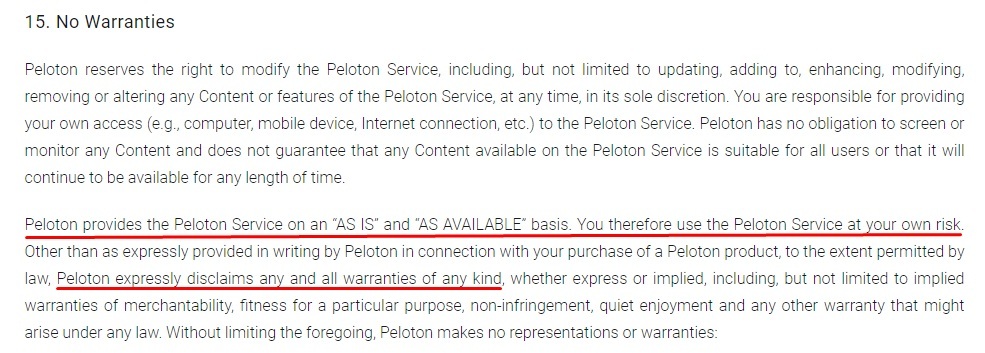
For another way of stating this disclaimer, take a look at how Zappos does it:

Accuracy Disclaimers
A website can never guarantee there won't be any mistakes or omissions. That's why most include an Accuracy Disclaimer to warn they don't warrant there won't be inaccuracies or typographical errors.
The Soap Co.'s Accuracy Disclaimer reminds users they shouldn't solely rely upon the information on the site because it may be inaccurate, including historical information, and the information should be used as "general information only."
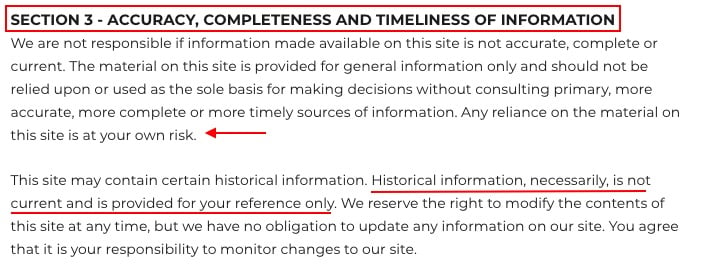
Zero Gravity states the site may include errors and may make changes to the content on the website, but does not promise the content will always be updated:

Return and Refund Policies
Disclaimers found in Return and Refund Policies are one of the key disclaimers ecommerce stores need to include.
No store is able to promise a purchaser will like their product once they receive it or a piece of clothing will fit. This is why including disclaimers in your Return and Refund Policies are a must.
These disclaimers inform purchasers you reserve the right to not refund or accept a return based on certain conditions. Most conditions are usually damaged or worn goods, not returned in the right manner, or have tags removed. Not including this disclaimer could create issues later on if there is a disagreement over the return.
Langly Co. states in its Return Policy how returns will be processed and that it reserves the right not to provide a refund if the items are damaged:

Lulus takes it a step further by stating multiple requirements to receive a returned product and even instances where refunds aren't accepted, such as a Final Sale item:
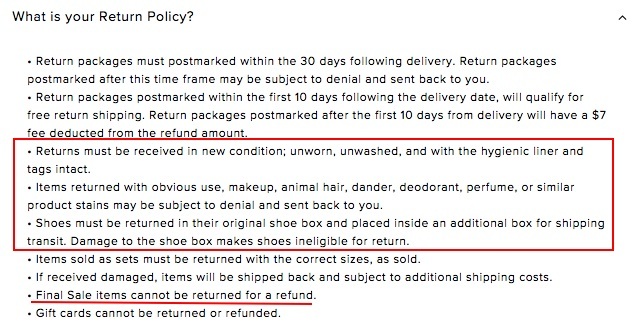
Shipping Delays
Weather, mishandling, or holidays can affect shipping times, which is why it's highly recommended that ecommerce stores include a disclaimer in their Shipping policies that states the site does not warrant there won't be shipping delays.
The disclaimer doesn't have to be long. It can be a simple sentence that states the site doesn't guarantee the date of delivery, like Toms does in its Shipping Policy:

You can also include a statement that clarifies when the shipping time frame begins and that delivery times vary depending on the method, as World Market does here:

Affiliate Disclaimers
Affiliate Disclaimers aren't typical for ecommerce websites because they are selling their own products. However, if your site sells your own products and receives a commission off of featured third-party products in your store, then you must disclose that according to the FTC.
You see these disclaimers mostly on blogs that sell their own items or courses and have affiliated partners they endorse or recommend.
Avocadu is an example of a site that sells its own product, but also has links to third-party affiliates that it receives a commission on:

Medical/Legal Disclaimers
For websites that feature information on healthy living, workouts, diet plans, or legal information, including a disclaimer is important.
These disclaimers tell users that information on the site is not meant for medical or legal advice, but is "informational" only. The disclaimers also state information on the site should not be taken as professional advice.
Medical/Health Disclaimer
if your ecommerce site sells fitness equipment, supplements, or healthy diet plans and products, you should include a medical disclaimer.
Tone it Up's Health Disclaimer warns users that information on the site should not be thought of as advice and is not a substitute for medical treatment or advice:
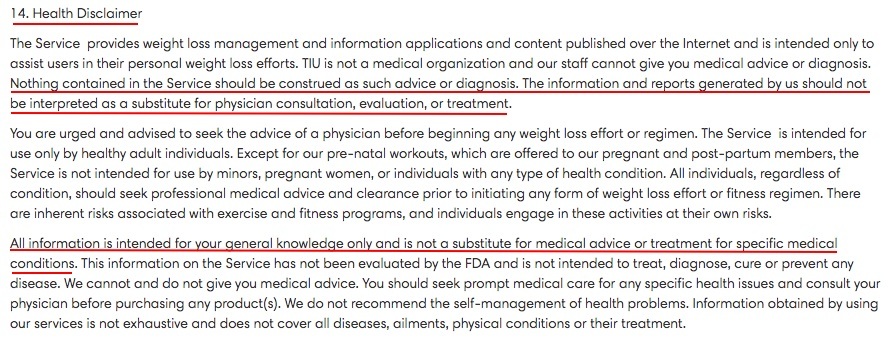
Rogue Fitness' disclaimer states information on the website is for "informational purposes" and extends its disclaimer to products on the site that are not manufactured by Rogue Fitness:

If your site sells vitamin or herbal supplements you also need to include a health disclaimer. Take a look at Vitacost's simple disclaimer that warns buyers before taking any supplements found on their site they should speak with a healthcare provider:
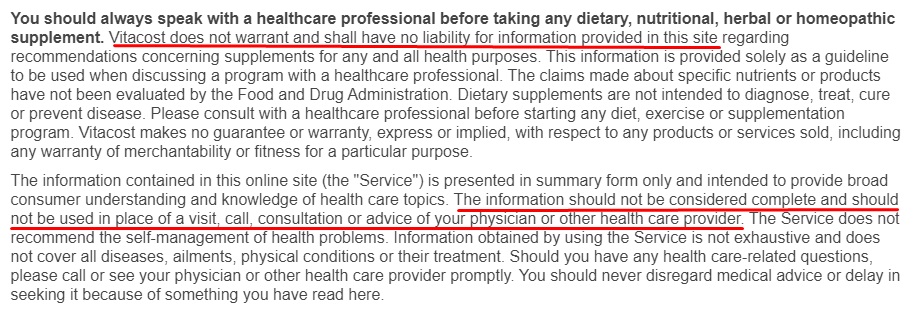
Medical disclaimers are even important for beauty product ecommerce sites. These disclaimers can remind purchasers to see a medical professional or that they don't guarantee products will work for everyone as The Anna Edit does in its disclaimer:
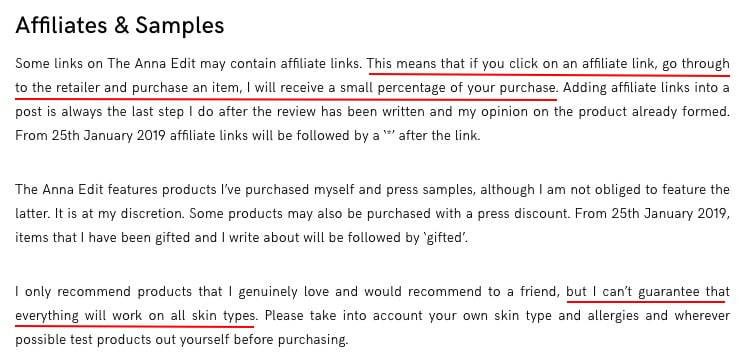
Legal Disclaimer
Ecommerce websites that offer information on legal events or legal concepts and sell products should include a disclaimer as well. These disclaimers function the same way as a medical disclaimer does.
An example of a legal disclaimer can be found on the American Bar Association's website:
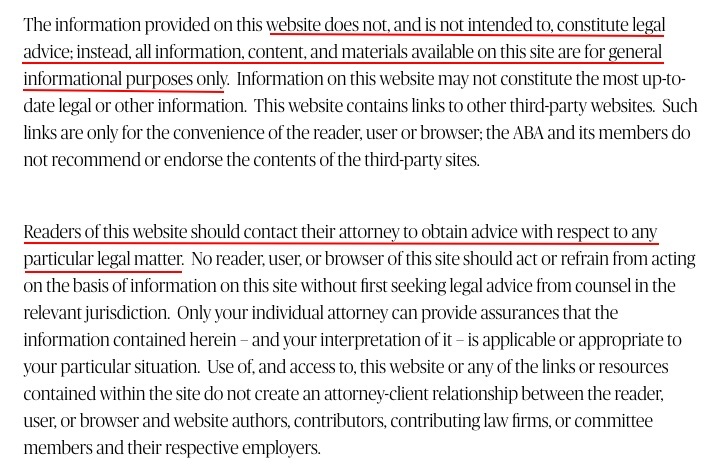
Financial Disclaimers
A niche disclaimer, like medical or legal disclaimers, can also be found on financial websites that offer financial books, courses, or tips.
NerdWallet's disclaimer states the site is only for educational and entertainment purposes and before making any financial decisions based on information on the website, users should speak with an accountant or financial advisor:

Financial experts that sell products or provide advice should have a disclaimer as well. David Bach does not guarantee the content on his site will result in earnings, but that the information on the site is conceptual and is not responsible for the risks associated with making financial decisions:

Separate Page Disclaimers
As was mentioned above, most disclaimers are included in the Terms of Use agreement websites and businesses post. However, you can also include a separate page for your disclaimers. It all depends on your preference and website. You'll see separate page disclaimers commonly on blogs or niche ecommerce sites.
Ashop has a separate Disclaimer page that includes its Disclaimer of Warranty, Limitation of Liability, and Third-Party Disclaimer:

Another tactic is to link your separate disclaimer page to a short, summarized clause within your Terms of Use or other legal agreement.
Summary
Disclaimers are essential statements to protect your site. They are even more important if you have an ecommerce store. While you will often have multiple disclaimers, depending upon the products you sell and your website, there are a few any ecommerce store should make sure they include:
- Limitation of Liability
- Disclaimer of Warranty
- Shipping delays
- Returns/Refunds
- Affiliate
- Niche disclaimers (medical, legal, or financial)

